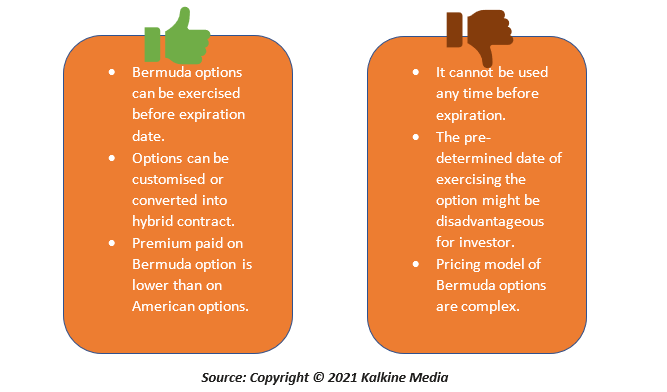What is Bermuda option?
Bermuda options are those options which can only be exercised on a specific or predetermined date. These options can be considered a blend of American options and European options. They can only be exercised after the completion of lock-in period.
Chiefly, Bermuda option gives the right to investor to sell or buy a security/ underlying asset on pre-determined dates or on the expiration date of the option contract.
Summary
- Bermuda options can only be exercised on a specific or predetermined date after the completion of lock-in period.
- The theory was proposed by Adam Smith in the year 1776.
- Bermuda is a type of exotic option which has components of both American and European option.
- Premium paid on Bermuda option is lower than on European options and higher than on American options.
Frequently Asked Questions (FAQs)
Why the name Bermuda options?
Bermuda is a type of exotic option which has components of both American and European option. The name Bermuda is derived from the place which lies between Europe and America. Bermuda option is also known as Mid-Atlantic option.
Unlike American option, the exercise date is limited to a certain pre-determined date. Also, unlike European option which can only be exercised on the maturity date of the option contract, a Bermuda option can be exercised before maturity too. Due to these reasons, Bermuda options are generally priced higher than European option and lower than American options.
Bermuda options are generally used in interest rate contracts and FOREX contracts.
What is the difference between Bermuda, American and European options?
American options: These options have a flexible exercise schedule, that is, the holder can exercise it before the expiration of contract. They are standardised and traded through exchange platforms.
European Options: These options do not have as much flexibility as American options, that is, they can only be exercised on the date of expiration of contract. Due to these inhibited characteristics, buyer has to pay less premium than American options. Moreover, these options are only traded over–the–counter.
Bermuda Options: It has components of both American and European options. They can either be exercised on the dates specified in the contract before expiration or on the date of expiration. They are customisable and traded bilaterally. The premium paid for buying Bermuda options, also lies between American and European option, that is, priced lower than American but higher than European options.

What are the advantages of Bermuda options?
The exotic option holder can use the option before the expiration date and convert it into shares before the expiration.
The dates on which Bermuda option can be exercised is known to both buyer and seller of the option while entering in the option contract.
Buyers of the exotic option have more power in comparison to seller in context of deciding the date on which option can be exercised.
Through these options, investor can buy or create a hybrid contract as well.
What are the disadvantages of Bermuda options?
Like American options, it cannot be used anytime before the expiration date.
In comparison to European options, Bermuda options are expensive.
Bermuda option can be exercised on per-determined and specific dates, and the market might not favour buyers at those specific dates.
The pricing of Bermuda option is complex and cannot be determined by employing Black Scholes Option Pricing model.

Source: Copyright © 2021 Kalkine Media
What are the special considerations in case of Bermuda options?
The investor might get the right to exercise the option on the first trading day of every month till the expiration of contract. In case the market price of share or underlying asset is higher than the strike price mentioned on the call option contract, then investor can exercise the option and buy shares at a lower price and make profit.
Similarly, when an investor is long in a put option and the market price is lower than the strike price, then the investor can buy the security at lower price in the market and sell it by exercising the option at a higher strike price. The resulting difference between the prices is the profit enjoyed by the investor.
In some Bermuda options, there is a restriction in context of early expiration dates. In such case, the option cannot be exercised till the early expiration date (like European option). After the early expiration date, it is converted into an American option, that can be used any time till the expiration of contract.
Example of Bermuda Options
Let us say that Mr. X has bought shares for $250 of Company A and will like to protect himself from any fall in the share prices.
Mr. X buys a Bermuda put option which has a strike price of $245 and will expire in 6 months. The option extends an insurance to the investor in case the share prices drop below $245 in the six months. The Bermuda contract bought by Mr. X states that option can be exercised on first trading day of each month after 2 months. Chiefly, the option can only be used after 2 months, and only on first trading day of each month.
Suppose, the share prices of Company A fall to $200 after 2 months, then investor exercise the right to sell on the strike price of $245. Therefore, investor only suffered the loss of $5
$250 (purchase price) - $245 (strike price) = $5
In case, the Bermuda put option was not purchased by the investor then he would have suffered the loss of $50, because:
$250 (purchased price) - $200 (market price) = $50
NOTE: The calculations should incorporate the premium paid for buying Bermuda put option, and fees paid to brokers.
 Please wait processing your request...
Please wait processing your request...